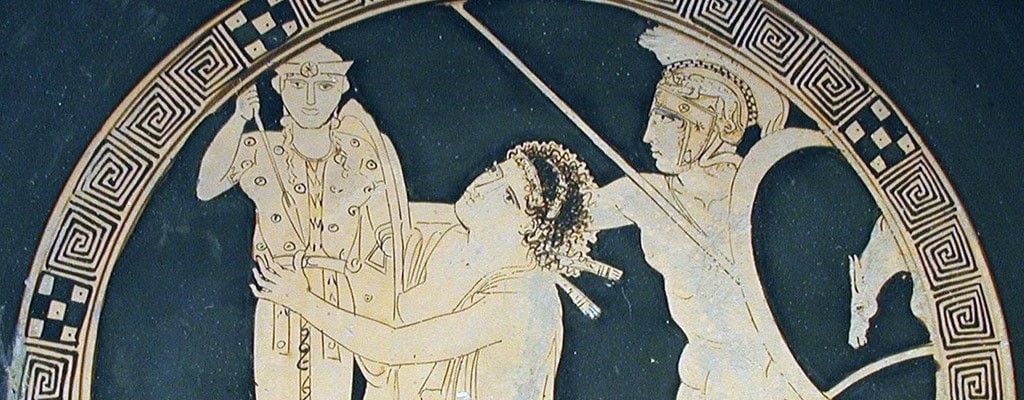Works of ancient Greek poetry are usually divided in 2 big categories: Epic poetry and Lyric poetry. Homer and Hesiod are the most recognized ancient Greek epic poets, while Sappho and Pindar are probably the most well-known lyric poets.
“…break me not with aching, nor with grief, Lady, tame my heart!” – Sappho, Ode to Aphrodite
Epic poetry
Epic poems are usually long, narrative poems which most often than not describe heroic deeds and events that are significant to the poet and to the people of the same culture. Many ancient writers around the world used epic poetry to describe heroic adventures and stories of their people and cultures. Many famous literary masterpieces all over the world (not just in ancient Greece) were written in the form of epic poetry, including such epics as the Iliad and the Odyssey, the Aeneid, The Epic of Gilgamesh and others.
Epic poems were ideal for expressing stories orally which is why they are common in the ancient world. Today, when we refer to the ancient Greek epic poetry, we usually refer to the Homer’s Iliad and Odyssey
These long epic poems are unlike most other poems we are familiar with in that they switch around from scene to scene and in between some scenes there is dialogue, like a play. Plato called epic poetry a mixture of dramatic and narrative literature because long speeches make up a big portion of both Iliad and Odyssey.
Speeches are most likely a throwback to the oral tradition of epic poetry, where a master story teller (rhapsode or rhapsodos in Greek) would recount the story to an audience or to a pupil. The storyteller usually played the lyre as he sang his improvised epic poem in the form of a song.
The central figure of ancient epic poetry is usually one or in some cases multiple heroes. In the Iliad and the Odyssey, the main heroes are Achilles, in the Iliad, and Odysseus in the Odyssey, but both epics, especially the the Iliad features multiple heroes such as Agamemnon, Odysseus, Paris and Hector for the Trojans and others. Key characteristics of epic poetry include:
- Epic heroes come from the heroic era, which precedes the Archaic Age in ancient Greece.
- The heroes of epic literature are bound by a code of honour.
- The form of the epic is verse – Dactylic Hexameters – marking it immediately as poetry.
- The language of epic poetry is often formulaic.
- The material of epic poetry is elevated; it does not dwell on the banal details of life.
- Speeches are frequent.
The most famous ancient Greek epic poets are Hesiod and Homer.

Lyric poetry
Anyone who has an ear for verse or song today will hear echoes of modern music in what the ancient Greeks called lyric poetry. After the age of epic poetry when stately poems of extraordinary heroic deeds – and length – reigned supreme, Greek tastes changed radically. Shorter, more personal poems written for feasts and weddings came into fashion. The greatest Greek lyric poet in ancient Greece was the incomparable Sappho, one of the rare women whose voice emerges from Greek antiquity.
The Lyric Age
As the Classical Age was on its way after 800 BC, the Greeks were introduced to a larger and more complicated world around them. Epic poetry and nostalgia for the old heroes started gaving way to lyric poetry.
It’s not clear exactly when the Greeks’ change of taste from epic to lyric poetry happened but scolar believe that by the seventh century BC lyric poetry was spreading quickly across Greece, especially among the Ionian populations who lived along the shores of the Aegean Sea and also on some of the Aegean islands. Lyric poem introduced experimention with different meters, and also all lyric poems were sang by the poets (such as Sappho and Pindar) to the accompaniment of a lyre, and this is why this type of poetry was named lyric poetry.
The lyre functioned much as the guitar does today, and lyric poetry in ancient Greece can be paralleled to modern rock music, with the lyric poets being the rock stars of ancient Greece. Ancient lyric poets wrote short, direct poems, expressing personal feelings, and they wrote lots of them.
Both arts also reflect their changing times. As Greece expanded, a restless crowd of enterprising merchants emerged. These entrepreneurs didn’t see their roots in the heroic past but sought from the arts an eloquent companion for their own experiences exploring new worlds and new opportunities. To suit the temper of these new riches, a lyric poet’s work needed to be direct and varied.
Ancient lyric poems – much like the modern ones – mostly focused around love. Love lost, love found, love’s pain and joy. It’s very unfortunate that all of the music of these lyric poems is now lost in time but it is to the great credit of the ancient Greek lyrical poets that much of their works’ original power still comes through the words of their poems even without the music that used to accompany them. No poetry shows this better than Sappho’s.
The most well-known ancient Greek lytic poet is Sappho. We know that Sappho lived and wrote her petry and music on the island of Lesvos sometime around 600 BC. Little else is known about her life other than she most likely ran some sort of a finishing school for girls who were in training to be the companions of men since most of her poems are addressed with great affection to young ladies. Because of this she has been labeled as a symbol of love and desire between women. The English words sapphic and lesbian are derived from Shappho’s own name and from the name of her home island respectively (Lesvos or Lesbos in Greek).
Typical of poets, however, Sappho herself and Sappho’s work cannot be easily labeled as “lesbian” because her poetry centres less on the distant objects which attract her than the larger world around them and the even greater world within the poetess herself. As few others in western civilization have she stands shoulder to shoulder with such greats as Shakespeare, and Keats exploring with her poems the intensity of emotions surrounding love.
History has been unkind to Sappho. Fixating on the hollow vessels in which she poured her abundant love, many critics, especially after antiquity, condemned her for unnatural passions, when based on her poems it’s evident that she’s not fascinated with the girl but with feeling the depths of despair and heights of ecstasy love brings. As a consequence of this narrow-mindedness, history has also been unkind to her work, most of which is now is lost. What little has survived the ravages of such deplorable bias consists of incomplete poems and scrappy fragments, an unspeakable tragedy to humankind. The failure of our predecessors to preserve her poetry is, simply put, the single most horrendous blunder in all of literary history.
Another even bigger change underlies lyric poetry. It’s clear that lyric poetry rose from a literate culture as opposed to the audiences of Homer and the other epic poets who were most likely illiterate themselves. Sappho and the rest of the lyric poets wrote their works (as opposed to composing them orally) and like modern singers, performed them as memorized pieces, not as verses fabricated spontaneously and unique to each performance. It’s very possible that some lyric poems probably circulated in written form, too. This new literature, in the truest sense of the word “written text,” looked ahead to the next stage in the evolution of ancient narrative arts when drama would dominate public attention.
A small collection of ancient Greek poems (translated into English)
One girl
by Sappho (translated by Dante Gabriel Rossetti)
I
Like the sweet apple which reddens upon the topmost bough,
Atop on the topmost twig, — which the pluckers forgot, somehow, —
Forget it not, nay; but got it not, for none could get it till now.
II
Like the wild hyacinth flower which on the hills is found,
Which the passing feet of the shepherds for ever tear and wound,
Until the purple blossom is trodden in the ground.
It’s no use / Mother dear…
by Sappho (translated by Mary Barnard)
It’s no use
Mother dear,
Ι can’t finish my weaving
You may blame Aphrodite
soft as she is
she has almost
killed me with
love for that boy
The first Olympic ode (excerpt)
by Pindar
Creatures for a day! What is a man?
What is he not? A dream of a shadow.
Is our mortal being. But when there comes to men
A gleam of splendour given of heaven,
Then rests on them a light of glory
And blessed are their days.
Various epigrams attributed to Simonides
by Simonides
Four thousand from Peloponnesus once fought here with three millions.
(On the general monument of all the Greeks who fell at Thermopylae)
Stranger, bear this message to the Spartans, that we lie here obedient to their laws.
(On the monument of the Spartans who fell at Thermopylae)
We lie here, having given our lives to save all Hellas when she stood on a razor’s edge.
(On the tomb of the Corinthians who fell at Salamis. The stone has been found)

